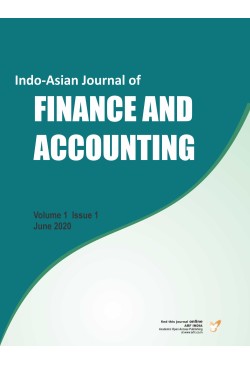
Indo-Asian Journal of Finance and Accounting
Frequency :Bi-Annual
ISSN :2582-6395
Peer Reviewed Journal
Life Expectancy in Different Countries and in the World
Problems of average life expectancy in Russia and in the world are considered. It has been established that in both cases, the average life expectancy is steadily increasing. It was confirmed that for the countries of the world in general, including Russia, the direct role of the material factor is decreasing, while that of non-material factors is increasing, while for Russia separately it was not possible to obtain a certain result in this direction.
Keywords: Average life expectancy, factors of material well-being, indicators of economic development
Out of Sample Testing for O’Neil’s Fundamental Stock Selection Strategy
We take a simple strategy that ranks stocks based on how they meet fundamental criterion outlined in the book How to Make Money in Stocks by Bill O Neil (1988). We model it on a single benchmark the Dow Jones Industrial Average from 1999-2017 with no stop loss. Previous studies by Lutey, Hassan, Rayome (2018) modeled a study from 1999-2015 with a stop loss and showed favorable results. The purpose of our paper is to test the study, without a stop and then see how it holds up two years out of sample (2015-2017). The results show it outperforms the Dow Jones Industrial Average by a larger margin than the previous study. The results hold out of sample and on two additional benchmarks (The S&P 1500, and Nasdaq). We also test overlapping timeframes (1999-2017, 2010-2017, and 2015-2017) on all three benchmarks with favorable results. McLean and Pontiff (2016) show that characteristic studies with excess returns fall apart post publication. Our analysis is that the results are still favorable which have implications for individual money managers, student funds, and applications for industry and efficient market studies.
Keywords: Can Slim, Fundamental Analysis, Automated Trading, Algorithmic Trading, Nasdaq 100, Dow Jones, S&P 1500, Target Date Funds, Portfolio Management
Exchange Rate Volatility, Foreign Private Investment and Performance in Nigeria’s Capital Market
Studies abound on exchange rate volatility and foreign investments in Nigeria. However, this study investigated the asymmetric effects ofexchange rate volatility and foreign private investment on the Nigeria’s capital market performance. Data obtained on capital market performance, foreign private investment, exchange rate volatility, and gross capital formation between 1986 and 2017 were analysed using the non-linear autoregressive distributed lag technique. The results showed that in the long run volatility of exchange rate, foreign private investment, and capital market performance are co-integrated. Besides, the study revealed that exchange rate volatility has asymmetric effects on capital market performance while foreign private investment exerts linear effects on capital market performance in both time horizons.
Keywords: Exchange Rate Volatility, Foreign Investments, Capital Market Performance, Asymmetric Approach.
Impact of Sustainability Reporting on Firms Performance in Ghana
There have been increased global concerns about the impact that business activities have on the society. Most corporations are currently responding to these concerns by adopting a strategic system of reporting which integrates the environmental and social impact of their business operations. The inclusion of sustainability issues into corporate annual reports denotes a firm’s commitment towards the achievement of sustainable development. The paper sought to review the current trends in sustainability reporting and assess the extent to which mining operations are complying with reporting guidelines in Ghana. The results of the study provide strong evidence on the effectiveness of using the environmental performance ratings as a tool in bringing industries into compliance with environmental performance standards. Although, thegeneral trend in the environmental disclosures levels had increased over the study period, the overall performance ratings of both the industrial and mining operations did not meet the standards required for environmental disclosures. The findings suggest an increase in the level of disclosure on pollution from industrial activities; however, the non-toxic discharge noise and vibration compliance level remained relatively low over the period.
Keywords: Sustainability, Environmental, Disclosures, Performance, Ratings
Trade Policy in an Islamic Perspective
This paper discusses the trade policy and trade performance in the context of Muslim countries. Firstly it provides an Islamic approach to trade policy matters. Trade policy in Islam is explained in third world perspective. Secondly, the effect of trade policy regimes on trade performance in these economies is analysed. The study underlines the need for a fair and free international trading system. Similarly, the study draws the inference that liberal trade policies have resulted in high economic growth rates even in Muslim countries all over the world. Therefore, for the attainment of better economic development and welfare trade policies are to be free and fair.
Keywords: Trade Policy, Islamic Countries, Third World, Trade Performance.
Research on the Effect of Free Trade Zone Establishment on Provincial Trade Development
The construction and development of free trade zones (FTZs) in China has been the country’s forefront for the national market opening up and the development of international trade, benefiting and stimulating the surrounding economy. Based on the panel data of 31 provinces in mainland China from 2008 to 2017, this paper uses the double difference econometric model to study the FTZs establishment impact on territorial provinces trade development from the import and export perspective. To then test the robustness of the experimental results using the counterfactual test method. The results show that: (1) The FTZs establishment has a significant positive effect on territorial trade development. (2) The FTZs establishment most apparent effect is on the total imports and exports, followed by the total imports, and finally the total exports. (3) Some lagging economic factors will lead to longer reaction times in basic development of FTZs and weaken FTZs establishment net effect.
Keywords: Free trade zone; Territorial Province; Trade development; Double difference model; Import and export; Counterfactual test; Positive effect